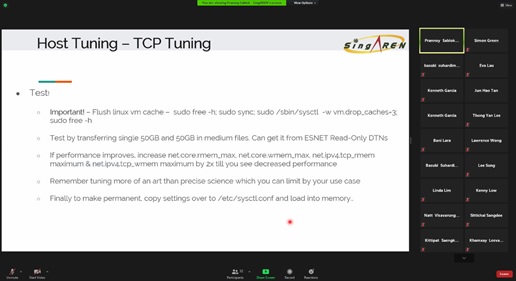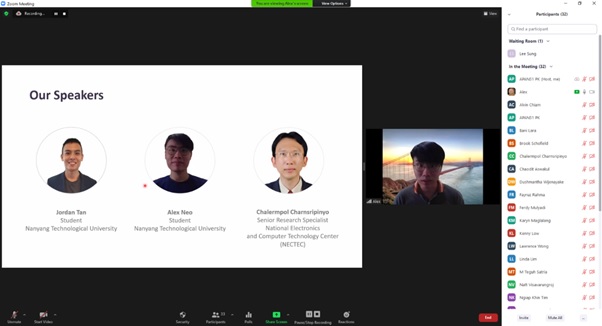SingAREN Knowledge-Sharing Workshops at APAN51 Virtual Conference
8 Feb 2021 – As a key driver in promoting and facilitating network-enabled research and education activities, APAN 51 Virtual Conference provided an excellent opportunity for the large Asia Pacific community of research and education network (REN) staff, academics and scientists to collaborate. The APAN 51 Virtual Conference featured exciting keynote speakers and training workshops, tutorials, presentations, demonstrations, conference sessions, and discussion panels.
As part of Asi@Connect project, SingAREN organised two training workshops which were held on 3 February 2021 (Wednesday) during this APAN51 Virtual Conference. Funded by EU and managed by TEIN*CC (Trans Eurasia Information Network Cooperation Center), these two knowledge-sharing workshops were organised as part of the “Large Data Transfer Infrastructure and Training for Asi@Connect” project.
The first workshop on “Setting Up and Running a Globus DTN and perfSONAR Node” was conducted by Prannoy Sablok (SingAREN). One of the components of the underlying infrastructure of the Asi@Connect project is the data transfer node (DTN). It is basically a server that has specialised components, a tuned operating system and the Globus application, which provides very high data throughput with a simple click-based browser interface.
SingAREN are setting up a Globus-based Data Transfer Node (DTN) network and corresponding PerfSonar nodes with our South East Asian partners in Thailand, Indonesia and the Philippines for the Asi@Connect project. This workshop shared SingAREN’s experience of selecting and tuning such a DTN and provided a detailed explanation along with a live demonstration on how to setup and run a Globus-based high performance data transfer node.
Structured as a linear guide to aid attendees in setting up high performance DTNs, this workshop included installation of Globus, system tuning, testing, troubleshooting problems and Q&As to clarify doubts. The live demonstrations on the Globus app at appropriate points in the presentation showed the large difference that tuning can make to the file transfer times and the ease of doing so.

Figure 1: Host tuning was covered during the “Setting Up and Running a Globus DTN and perfSONAR Node” workshop.
“I learned a lot about the data transfer system used in research, particularly how Globus is utilised in transferring huge data.” said Lee Thong Yan, National Supercomputing Centre.
The second workshop on “Building a Computational Platform with Kubernetes” was jointly conducted by Jordan Tan, Alex Neo, Chalermpol Charnsripinyo, Ridnarong Promya, and Napat Chuangchunsong (NTU, SingAREN and NECTEC, Thailand). The sharing of Kubernetes clusters among multiple users, otherwise known as multi-tenancy, poses several challenges over single-tenant clusters. To overcome the challenges of the need for namespace isolation and fair resource allocation, our team have designed a management portal web application for Kubernetes, called Kubeinn. The SingAREN team shared about our experience and approach to designing this application.

Figure 2: The “Building a Computational Platform with Kubernetes” workshop was jointly conducted by Jordan, Alex, Chalermpol Charnsripinyo, Ridnarong Promya, and Napat Chuangchunsong (NTU, SingAREN and NECTEC, Thailand).
Building an efficient Kubernetes cluster consists of many aspects, and one key factor is the scheduler. The scheduler determines the nodes that will deploy the containers, which plays a significant role in ensuring proper cluster resource utilisation. The SingAREN team shared examples of different types of schedulers and their purposes in ensuring optimal cluster resource utilisation in this training session.
The team from NECTEC, Thailand, shared about the management of Elastic Cloud/Container as a Service (MECAs) Platform using Kubernetes. They presented on the design and development of a cloud container service platform named MECAs. The system is developed from different software tools to meet their design and requirements. For container orchestration, they use Kubernetes for managing containers across their hyper-converged infrastructure. The NECTEC team also shared their experience of developing a cloud container service platform and in using Kubernetes.
“The group’s work in setting up Kubernetes cluster is eye-opening.” said Kwa Teck Poey, Singapore Polytechnic.
Beneficiaries of the two training sessions include research and education institutional partners from various parts of the world, such as Singapore, United States, China, India, Bhutan, Japan, Indonesia, Thailand and Philippines. 42 participants attended the virtual training session on DTNs while a bigger group of 58 participants attended the highly-anticipated workshop on Kubernetes.
“The sharing sessions are insightful and we get to understand better how both Kubernetes and DTNs work.” said Eva Lau, National Supercomputing Centre, Singapore.
The well-received DTNs workshop provided participants with useful overview of the basics of DTNs, their setup, the associated software tools and tuning of the parameters. Insights gained about DTNs and the use-cases from this workshop can help participants in enabling their partners in their domestic scientific community to leverage the high bandwidth networks. Participants have also commented that the information-sharing is useful for the efficient transfer of large data sets.
“I gained understanding of the requirements needed to set up the DTN and to build containers with Kubernetes.” said Bernard Sih, National Supercomputing Centre, Singapore.
Bridging theory with practice, participants benefited greatly from the live demonstrations in the well-attended Kubernetes session. The SingAREN and NECTEC teams’ experience-sharing helped participants to overcome challenges when building containers with Kubernetes.
“The workshops definitely improved my theoretical understanding of Kubernetes and perfSonar through excellent demo-based presentation.” said Chimi, Royal University of Bhutan.
For more information on Asi@Connect, please refer to https://www.tein.asia/.
Written by Linda Lim

